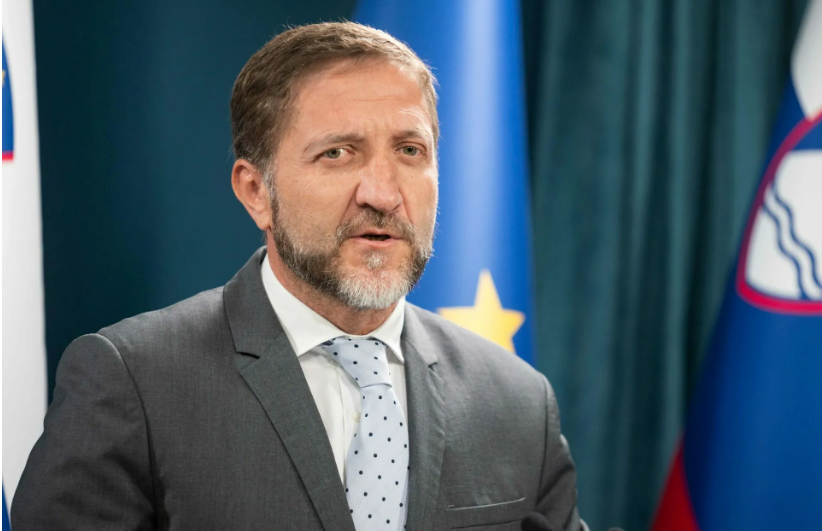A creative way of justifying government failures is by blaming other government failures. Because of the delay in adopting the pension reform, Slovenia is not planning to submit its next request for a disbursement from the European Union’s recovery mechanism until mid-2025, according to the Minister of Finance, Klemen Boštjančič. On Tuesday, EU finance ministers approved a slightly revised Slovenian recovery plan, which is the basis for the drawdown from the mechanism, the Slovenian Press Agency (STA) reported. Meanwhile, the Minister of Finance blamed the failure on the former government and Secretary Monika Kirbiš Rojs, who obtained the billions from the recovery mechanism in the first place.
“It is very likely that we will submit our next request sometime before the summer or even after the summer of 2025,” Minister of Finance Klemen Boštjančič said of Slovenia’s fourth request for a disbursement from the European Union’s Recovery and Resilience Facility (RRF), which was established after the Covid-19 pandemic, ahead of Tuesday’s meeting of EU finance ministers in Brussels.
He said that certain investments and reforms in the plan are so large that they cannot be adopted “overnight”, highlighting the pension reform which Slovenia should adopt by the end of this year, according to the recovery plan. The postponement of the pension reform has therefore become an excuse for not having submitted a request for European money yet.
There will be no pension reform, which means that there will be no payments from the recovery fund either?!
While Boštjančič tried to use the excuse that the pension reform is currently being discussed in the Economic and Social Council, he apparently forgot that it is the government and its inaction that is to blame for the fact that the reform is only at this stage, as it has been delayed for years. The government plans to come up with indicative final solutions early next year and then finalise them with the social partners in the spring, but we know how similar promises ended up in terms of the healthcare reform.
“This delay in the timetable was, in a way, planned, and will ultimately not play a significant role if we actually implement (the reform),” the Minister stressed. He added that the delay in the adoption of the pension reform will only affect the delay in the submission of claims, but not the level of payments. The problem is that everyone who knows Slovenian politics already knows that there will be no such reform a year and a half before the end of the current government term. Is this a sign that the payments from the European Recovery Fund will not be realised at all?!
With almost unbelievable words about Monika Kirbiš Rojs
The Minister indulged in even greater cynicism in response to criticism by Monika Kirbiš Rojs, Secretary-General of the Council of State, at a recent meeting of the National Assembly’s Commission for Public Finance Control that Slovenia had only used up a third of the funds from the Recovery and Resilience Fund.
Boštjančič bizarrely said the following in Brussels: “In 2021, the previous government – and Mrs Kirbiš played an important role there – put these things on the roadmap for recovery and resilience, and our government has to deliver on them. I know very well how the processes were run, often overnight. We wanted to be liked and to be one of the first to go to Brussels with a very comprehensive reform package. It is very easy to be clever when you write things down and then point the finger at someone else, who then has to implement it. On the other hand, the current opposition, which was the coalition at the time, takes every possible opportunity to make sure that some reforms do not happen.”
This is a unique statement in Slovenian politics that will resonate for generations. The Minister of Finance reproached the Secretary-General for Cohesion from the previous government for having done her job too well, for having provided Slovenia with too much money, which they, in their infinite incompetence, are now unable to spend!
And he even decided to blame the opposition for it, which is apparently blocking the reforms. How can the opposition block reforms, when the coalition has a very solid majority in Parliament? It is difficult to understand these words in any other way than that Boštjančič is angry because the previous government imposed on them such a heavy burden of drawing down billions, which they are now unable to draw down because they do not know how to implement projects. As MP Andrej Hoivik said: “The Minister of Finance is writing his own interpellation with this speech.”
All cohesion funds were provided by the Janša governments
As a reminder, the Janez Janša government negotiated 1.78 billion euros in grants and 705 million in loans under the Recovery and Resilience Mechanism. Slovenia has experience from three different financial perspectives. The Janša government is also responsible for negotiating all the European funds we have received since we joined the Union. Interestingly, all three were negotiated by the governments under Janez Janša, the first one for 2007-2013, the second one for 2014-2020, and the last one for 2021-2027, which also included these funds from the Recovery and Resilience Fund, which is being discussed now. All three financial perspectives were extremely favourable for Slovenia. For example, the last one, where a cut of around 2.8 billion euros was put on the table in 2018 from the time of the Šarec government, was increased by almost half a billion euros at the EU Council meeting on the 21st of July 2020.
I. K.


